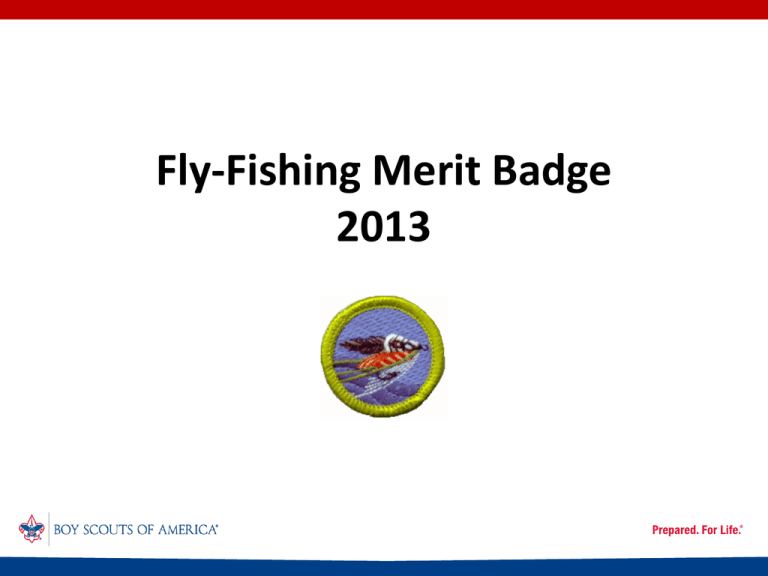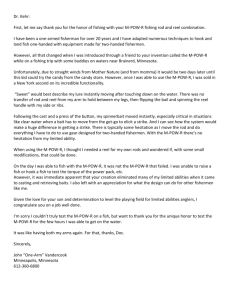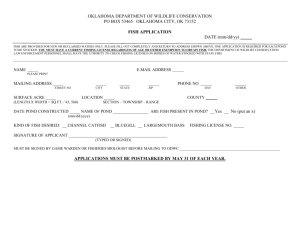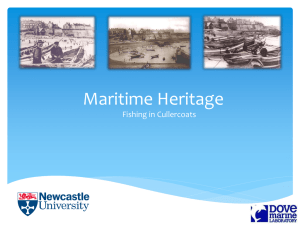Fishing Merit Badge 2012
advertisement

Fly-Fishing Merit Badge 2013 Injuries and Treatment (1) • • • • • • • Cuts Scratches Puncture wounds Hypothermia Dehydration Heat exhaustion Heatstroke Fish Hook Removal (1) Press Press Safety Practices (1) Name and explain five safety practices while fishing 1. Trip itinerary 2. Wading 3. Boating 4. Canoe travel 5. Near-drowning A Balanced System (2) Reel Rod Line Leader Assembling a balanced fly-fishing rig is as easy as matching the numbers on the fly line to the numbers on the fly reel and rod. How should you care for this equipment? Balanced System in Action Type of Line How and when to use these lines? Release button Reel frame Handle Adjustable drag knob Counterbalance Spool Spool arbor Post Reel foot Standard fly reel Line guard Arbor Knot (3a) Needle Knot (3c) Nail Knot (3c) Loop-to-Loop (3c) Double Surgeon’s Loop (3d) Step 2 Step 1 Final Blood Knot (3d) Improved Clinch Knot (3e) Fly Tying (4) • Tie at least two of the following flies: – Dry flies – Wet flies – Nymphs – Streamers – Bass bugs – Poppers How are DRY FLIES used? • What do they imitate? Royal Wulff How are WET FLIES used? • What do they imitate? Woolly Bugger How are NYMPHS used? • What do they imitate? March Brown Nymph How are STEAMERS used? • What do they imitate? Little Trout How are BASS BUGS used? • What do they imitate? Green Leech Bass Bug How are POPPERS used? • What do they imitate? Red and White Bass Popper Casting (5) • Demonstrate the ability to cast a fly 30 feet consistently and accurately using the following techniques: – Overhead cast – Roll cast Matching the Hatch (6) • Go to a suitable fishing location and make observations on the type of insects fish may be eating. – – – – Floating on the water Flying in the air Beneath the water Hiding under rock • Explain the importance of matching the hatch. Leave No Trace (7) • Explain the importance of Leave No Trace. – – – – – – – Plan Ahead and Prepare Travel and Camp on Durable Surfaces Dispose of Waste Properly Leave What You Find Minimize Campfire Impacts Respect Wildlife Be Considerate of Other Visitors • How does it positively affects fishing resources? Leave No Trace Cont. (7) • How does it positively affect fishing resources? • Discuss the meaning and importance of catch and release (“biological LNT”). • Describe how to properly release a fish safely to the water. Biological LNT: Bait Fish Why are bait fish not to be released? • Be aware that releasing live bait and bait water can introduce undesirable fish, parasites, or diseases to native fish. • Dispose of unused live bait and any water in the bait bucket on land well away from any water. Fishing Regulations (8) • Review regulations affecting game fishing where you live. • Explain why they were adopted? • What do you accomplish by following these regulations? Proper Conduct (9) • Explain what good outdoor sportsmanlike behavior is. • How does it relate to a fisherman? The Outdoor Code (9) As an American, I will do my best to: • Be clean in my outdoor manners I will treat the outdoors as a heritage. I will take care of it for myself and others. I will keep my trash and garbage out of lakes, streams, fields, woods, and roadways. • Be careful with fire I will prevent wildfire. I will build my fires only where they are appropriate. When I have finished using a fire, I will make sure it is cold out. I will leave a clean fire ring, or remove all evidence of my fire. The Outdoor Code Cont. (9) • Be considerate in the outdoors I will treat public and private property with respect. I will use low-impact methods of hiking and camping. • Be conservation minded I will learn how to practice good conservation of soil, waters, forests, minerals, grasslands, wildlife, and energy. I will urge others to do the same. What Does the Outdoor Code Mean to a Fisherman? What about: • • • • Littering Trespassing Courteous behavior Obeying fishing regulations Fish Caught (10) • Catch at least one fish. • If regulations and health concerns permit, clean and cook a fish you have caught. Otherwise, acquire a fish and cook it. Fish Caught (10) • How do you release one fish unharmed? • How did you clean and cook one fish? Credits The presentation slides and photos were compiled by Bill Pepito, member of the National Fishing Committee, Central Region Outdoor Program fishing chair, certified angler educator with the Wisconsin Department of Natural Resources. Special acknowledgement to the BSA national fishing team for its assistance and Troop 190 from the Northeast Illinois Council, whose picture is posted in this presentation. The presentation is a work in progress and is subject to change. Send your recommendations, suggestions, comments to my attention at billpepito@gmail.com or billpepito64@yahoo.com. FISH ON!




